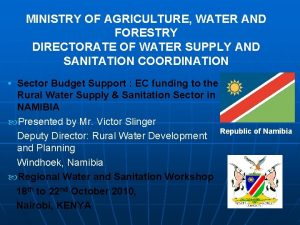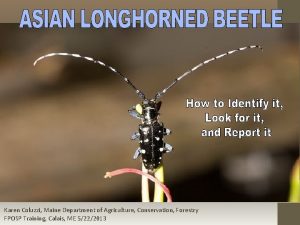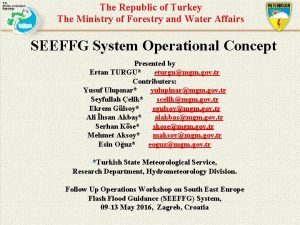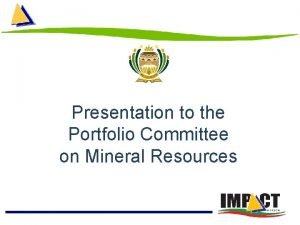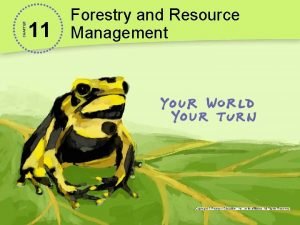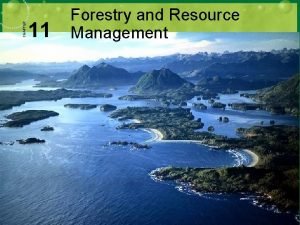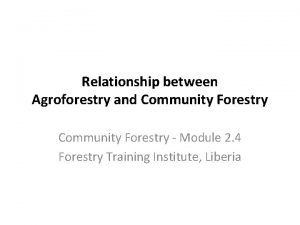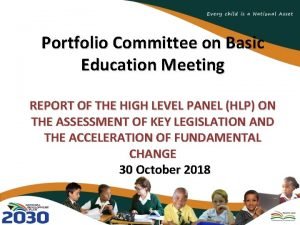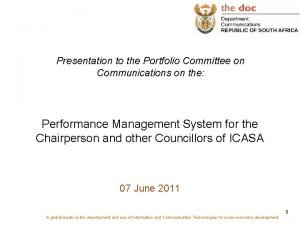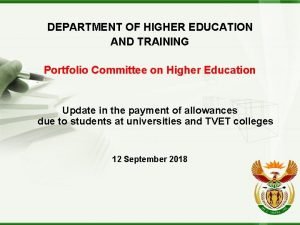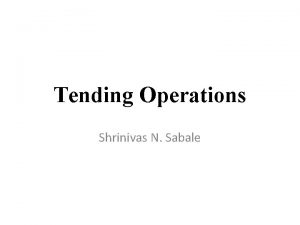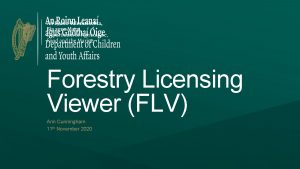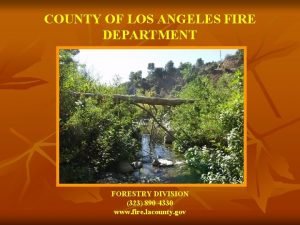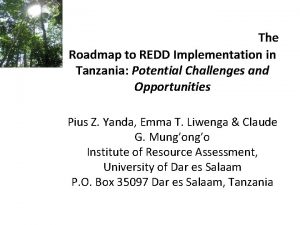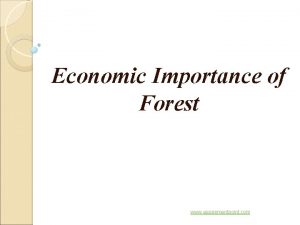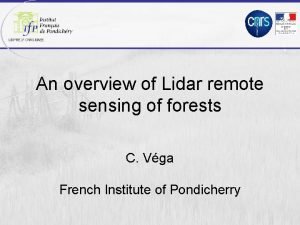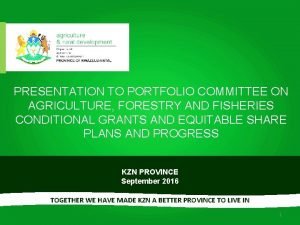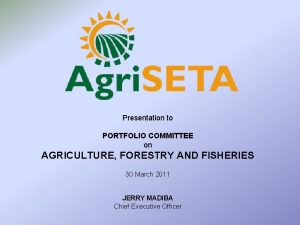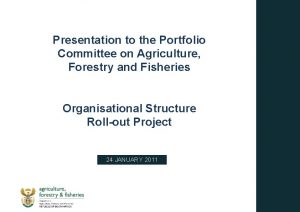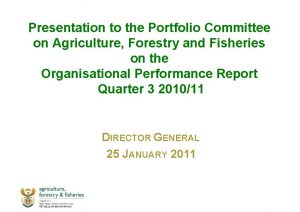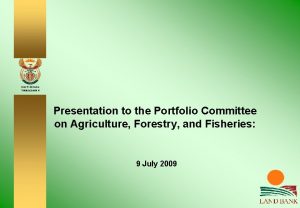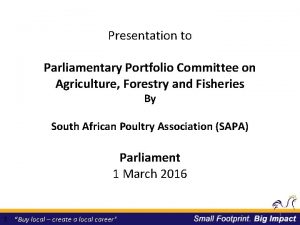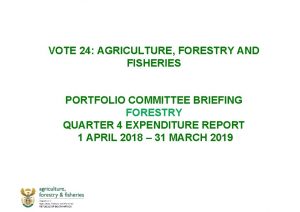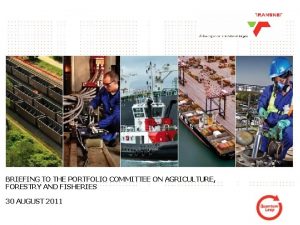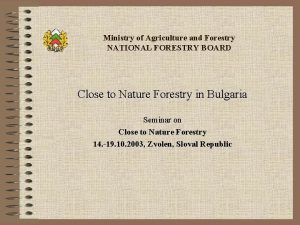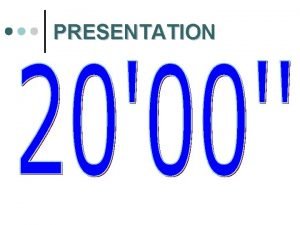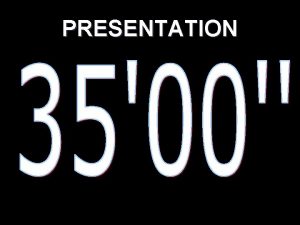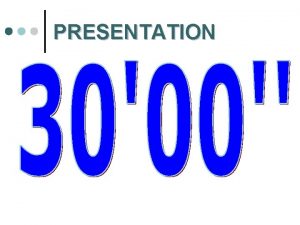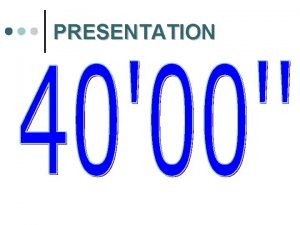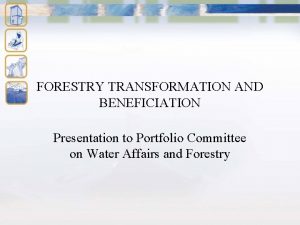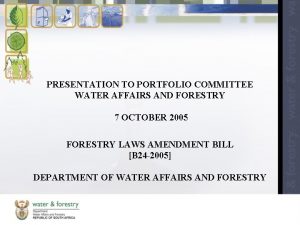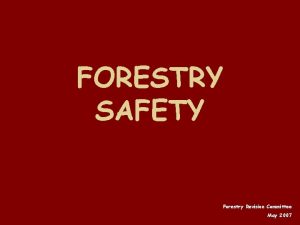PRESENTATION TO PORTFOLIO COMMITTEE ON AGRICULTURE FORESTRY AND























- Slides: 23

PRESENTATION TO PORTFOLIO COMMITTEE ON AGRICULTURE, FORESTRY AND FISHERIES ON TAGGING OF FERTILIZER AND FEEDS BILL [B 41 -2012] 19 MARCH 2013 Presented by: Yolandé van Aswegen Office of the Chief State Law Adviser 1

INTRODUCTION n The Portfolio Committee on Agriculture, Forestry and Fisheries (“Committee”) has requested the Office of the Chief State Law Adviser (“OCSLA”) to provide a legal opinion in relation to the tagging of the Fertilizer and Feeds Bill, [B 41 -2012] (“Bill”). 2

BACKGROUND OF BILL The Bill was— n certified by the OCSLA on 24 August 2012; n introduced on 27 November 2012; and n tagged by the Joint Tagging Mechanism (“JTM”) on 31 January 2013 as section 76 Bill that affects the provinces n The OCSLA is of the view that the Bill must be tagged as a section 75 Bill that does not affect the provinces. 3

THE CONSTITUTION n Section 75 – Ordinary Bills not affecting provinces v “(1) When the National Assembly passes a Bill other than a Bill to which the procedure set out in section 74 or 76 applies, the Bill must be referred to the National Council of Provinces and dealt with in accordance with the following procedure: …” v The NCOP must — q pass the Bill; q pass the Bill subject to amendments; or q reject the Bill 4

CONSTITUTION(continued…) n Section 76 – Ordinary Bills affecting provinces v “(1) When the National Assembly passes a Bill referred to in subsection (3), (4) or (5), the Bill must be referred to the National Council of Provinces and dealt with in accordance with the following procedure: …”. v “(2) When the National Council of Provinces passes a Bill referred to in subsection (3), the Bill must be referred to the National Assembly and dealt with in accordance with the following procedure: …”. v “(3) A Bill must be dealt with in accordance with the procedure established by either subsection (1) or subsection (2) if it falls within a functional area listed in Schedule 4 or provides for legislation envisaged in any of the following sections: …” 5

CONSTITUTION(continued…) n SCHEDULE 4: FUNCTIONAL AREAS OF CONCURRENT NATIONAL AND PROVINCIAL LEGISLATIVE COMPETENCE v Examples: Agriculture, industrial promotion, trade, tourism, vehicle licensing, etc. n In tagging this Bill, we must establish whether the Bill, in substantial measure, falls within Schedule 4 and whether it affects the provinces. 6

CASE LAW Ex parte the President: In re Constitutionality of the Liquor Bill 2000 (1) BCLR 1 (CC) (“Liquor Bill case”) n Mostly dealt with constitutionality of the Liquor Bill, dealing with the registration and manufacture, wholesale distribution and retail sale of liquor on basis of the Executive’s power to “intervene” into areas of exclusive provincial legislative competence, when necessary (e. g. to maintain economic unity). n The CC lays down the “substantial measure” test for tagging of Bills. 7

CASE LAW Liquor Bill Case (continued) n The CC confirms the substantial measure test for tagging (in paragraph 27) that— “…section 76(3)…requires that a Bill must be dealt with under the procedure established by either section 76(1) or section 76(2) amongst others, “if it falls within a functional area listed in Schedule 4”. It must be borne in mind, moreover, that section 76 is headed “Ordinary Bills affecting provinces”. This is in my view a strong textual indication that section 76(3) must be understood as requiring that any Bill whose provisions in substantial measure fall within a functional area listed in Schedule 4 be dealt with under section 76. ” (Our emphasis. ) 8

CASE LAW Tongoane and Others v National Minister for Agriculture and Land Affairs and Others 2010 (8) BCLR 741 (CC) (“Tongoane case”) n n n The CC determined the proper test for the tagging of the Communal Land Rights Bill (previously B 67 -2003, and now Act No. 11 of 2004) (“CLARA”). The High Court held that, in classifying the CLARA for the purposes of tagging, Parliament had applied the incorrect test, namely, the “pith and substance” test, instead of the “substantial measure” test suggested by the CC in the Liquor Bill case. The High Court refused to declare the CLARA invalid for failure to enact it in accordance with the correct procedure. 9

CASE LAW Tongoane case (continued) n The CC concluded that there is a difference between determining whether the National Assembly or National Council of Provinces (“NCOP”) has the competence to legislate in a particular field, and determining how a Bill ought properly to be tagged and ultimately enacted. n These are two different processes for which two different tests are to be applied. Ngcobo CJ reaffirmed the decision of the CC in the Liquor Bill case, at paragraphs 63 to 64, that the statement: “any Bill whose provisions in substantial measure fall within a functional area listed in Schedule 4”, formulates the test for determining the procedure to be followed in enacting a Bill. 10

CASE LAW Tongoane case (continued) n Ngcobo CJ further, at paragraph 58, states the following: “What matters for the purposes of tagging is not the substance or the true purpose and effect of the Bill, rather, what matters is whether the provisions of the Bill “in substantial measure fall within a functional area listed in Schedule 4”. This statement refers to the test to be adopted when tagging Bills. This test for classification or tagging is different from that used by this Court to characterise a Bill in order to determine legislative competence. This “involves the determination of the subject-matter or the substance of the legislation, its essence, or true purpose and effect, that is, what the [legislation] is about”. (Our emphasis. ) 11

CASE LAW Tongoane case (continued) n The test for tagging must be informed by the Bill’s purpose. n The process is concerned with the question of how a Bill must be considered by the provinces and in the NCOP. The question of how a Bill must be considered by the provincial legislatures depends on whether it affects the provinces. n The more it affects the interests, concerns and capacities of the provinces, the more say the provinces should have on its content. 12

CASE LAW Tongoane case (continued) n Ngcobo CJ (paragraphs 69 and 70) states as follows: “The tagging of Bills before Parliament must be informed by the need to ensure that provinces fully and effectively exercise their appropriate role in the process of considering national legislation that substantially affects them. Paying less attention to the provisions of a Bill once its substance, or purpose and effect, has been identified undermines the role that provinces should play in the enactment of national legislation affecting them. . To apply the “pith and substance” test to the tagging question, therefore undermines the constitutional role of the provinces in legislation in which they should have a meaningful say, and disregards the breadth of the legislative provisions that section 76(3) requires to be enacted in accordance with the section 76 procedure. ” (Our emphasis. ) 13

OCSLA’S OPINION n The test used by the JTM when tagging the Bill is similar to the “pith and substance” test and relates more to the question of legislative competency than to the classification of the Bill for tagging purposes. n This “undermines the constitutional role of the provinces in legislation in which they should have a meaningful say”, as stated in the Tongoane case. n In other words, the constitutional role of the provinces is to legislate on matters that substantially affect them. 14

OCSLA’S OPINION (continued) n The fact that the Bill contains regulates matters that are administered by the Department of Agriculture, Forestry and Fisheries, does not mean that it therefore falls squarely within the functional areas listed in Schedule 4 and must be classified as a section 76 Bill that substantially affects the provinces. n There may be some provisions in the Bill that deal with certain agricultural products (e. g. fertilizers, feeds, raw materials, etc. ) and others that deal with matters of licensing, manufacturing and registration in respect of these products, but none of these provisions have a substantial impact on the provinces, since this Bill, in our view, merely deals with licensing, registration, prohibitions, etc. on a national level. 15

OCSLA’S OPINION (continued) n We have noted the CC’s discussion in the Liquor Bill case on the ordinary definition of “trade”, which is the “[b]uying and selling or exchange of commodities for profit, spec. between nations; commerce, trading, orig. conducted by passage or travel between trading parties”. n The CC concluded that, in accordance with its ordinary meaning, the concurrent national legislative power with regard to “trade” includes the power not only to legislate intra-provincially in respect of the liquor trade, but to do so at all three levels of manufacturing, distribution and sale. 16

OCSLA’S OPINION (continued) n Our contention is that, although this Bill does contain elements of the regulation of registration and licensing of products and premises that may be used in agriculture, those elements do not in substantial measure, fall within in the areas of “trade” and “agriculture”, as listed in Schedule 4 to the Constitution and do not necessarily affect the provinces. 17

Difference between processes Section 75 vs Section 76 n Liquor Bill case - A Bill wrongly classified as a section 75 matter, the result could be unconstitutional. n Cameron AJ (paragraph 26): v comments that the difference in the voting procedure between the two NCOP Procedures (i. e. section 75 and section 76), is material. v “since whether a provincial delegation votes corporately through its head of delegation, as prescribed by section 65, or individually by each member casting a vote, as prescribed by section 75(2), may in defined circumstances be determinative as to whether the NCOP passes a Bill. ” 18

Difference between processes Section 75 vs Section 76 (continued) n The differences between the sections 75 and 76 procedure, is outlined as follows: Ø If the NCOP objects to a section 76 bill introduced in the National Assembly, the National Assembly cannot simply override the NCOP’s objection. Instead, the bill must first be referred to the Mediation Committee in an effort to resolve the conflict between the two houses. Ø If the decision taken by the Mediation Committee has failed to resolve the conflict between the two houses and the NCOP continues to object to a section 76 bill introduced in the National Assembly, the National Assembly can override the NCOP’s objection only with a two-thirds majority. 19

Difference between processes Section 75 vs Section 76 (continued) Ø When the NCOP votes on a question under a section 76 bill, each province has a single vote which is cast by the head of the delegation and the question is agreed when at least five provinces vote in favour of the question. When the NCOP votes on a question under section 75, however, each delegate has one vote and the question is decided by a majority of the votes cast, subject to a quorum of one-third of the delegates. Ø The section 76 -procedure appears to have been created to reinforce the principle of multi-sphere government in the Constitution. 20

Difference between processes Section 75 vs Section 76 (continued) n Our view is that this Bill must be dealt with in terms of section 75 of the Constitution and this classification of the Bill is not unconstitutional. n Even in the event that elements of this Bill may relate to functional areas that fall within Schedule 4 to the Constitution, since the National Assembly is constitutionally mandated to pass legislation that fall within Schedule 4. In this regard, section 44(1)(a) of the Constitution provides that— “[t]he national legislative authority as vested in Parliament— (a) confers on the National Assembly the power— (i) to amend the Constitution; (ii) to pass legislation with regard to any matter, including a matter within a functional area listed in Schedule 4, but excluding, subject to subsection (2), a matter within a functional area listed in Schedule 5. ” (Our emphasis. ) 21

Difference between processes Section 75 vs Section 76 (continued) n Bills that may impose obligations on provinces or may be the subject of conflicts with provincial legislation, must follow the procedure contained in section 76 of the Constitution, but this Bill should not. n Provincial legislatures would be burdened with matters that do not fall within the constitutionally defined jurisdiction of the provinces. n It would be inappropriate to pass this Bill that deals with the requirements for the registration and licensing of certain agricultural products and the establishment of a Technical Advisory Council, under section 76 of the Constitution merely because it deals with “agriculture”. n There is the danger that passing this Bill that does not contain provisions that affect the provinces, may be invalid because provincial delegates, and not individual delegates, will vote on (and ultimately pass) the Bill. 22

Thank you 23
 Ministry of agriculture, water and forestry directorates
Ministry of agriculture, water and forestry directorates Mendel university fees
Mendel university fees Maine department of agriculture conservation and forestry
Maine department of agriculture conservation and forestry Republic of turkey ministry of agriculture and forestry
Republic of turkey ministry of agriculture and forestry Portfolio committee on mineral resources and energy
Portfolio committee on mineral resources and energy Forestry and resource management chapter 11 answers
Forestry and resource management chapter 11 answers Forestry and resource management chapter 11 answers
Forestry and resource management chapter 11 answers State and private forestry
State and private forestry Difference between agroforestry and community forestry
Difference between agroforestry and community forestry Portfolio committee
Portfolio committee Portfolio committee on basic education
Portfolio committee on basic education Portfolio committee on communications
Portfolio committee on communications Portfolio committee on basic education
Portfolio committee on basic education Portfolio committee on higher education
Portfolio committee on higher education Weebly student portfolio
Weebly student portfolio Tending operations includes
Tending operations includes Forestry licence viewer
Forestry licence viewer La county forestry
La county forestry Forestry io roadmap
Forestry io roadmap Careers related to forestry
Careers related to forestry Conclusion of deforestation
Conclusion of deforestation Lidar
Lidar Miisun forestry
Miisun forestry Coop
Coop
